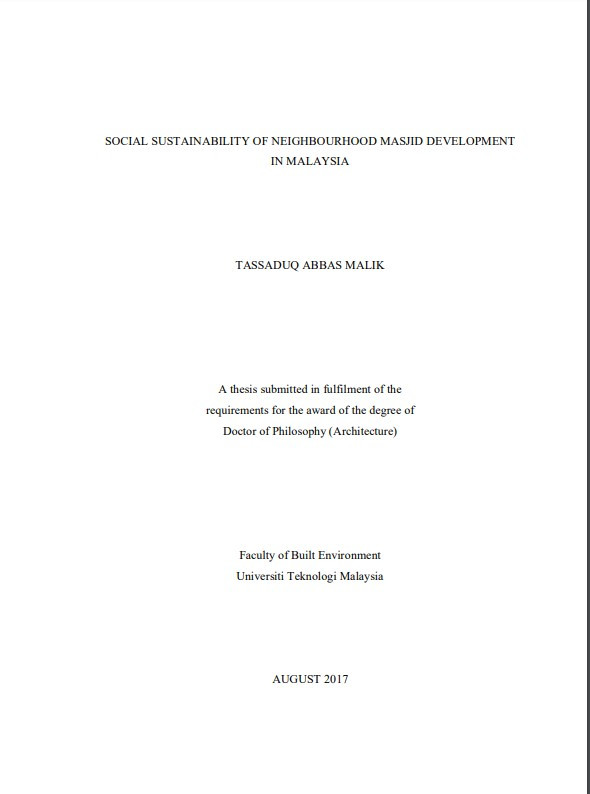
Attendance in mosques has been observed to be seriously low in recent times. It is rare to find any mosque being more than 5% occupied to its capacity except during Friday congregational prayers and during other celebrations in the Islamic calendar. The current mosque setting differs from the concept adopted by the Prophet Muhammad (pbuh), during which time the mosque was used as an ummah development centre. Matters relating to the performance of the congregational prayers is the only role reflected in the present-day mosque design and functions. Importance should be given to the mosque as a community building and platform for community assimilation. Therefore, this study is aimed at proposing a socially sustainable assessment model that provides for social sustainability in neighbourhood mosques, with a view to informing architectural design decisions. Accordingly, a pragmatic phenomenological approach was adopted to elicit data on social sustainability criteria correlated to mosque social functions. This was achieved through (1) intensive literature review and content analysis, (2) interview with 20 experts, (3) field observation, case study and scrutiny of architectural drawings of existing neighbourhood mosques, (4) survey questionnaire administered to 300 respondents, (5) analysis of data using thematic content analysis and descriptive statistics. The result shows that social sustainability is an integral component of mosque design and implementation of its criteria is inevitable in neighbourhood mosque design. The study revealed mosque’s social functions and identified their importance. The study further identified the spaces requiring design attention for mosque social functions. Consequently, analytical interpretation of the findings identified the core socially sustainable activities, mosque zoning and spatial considerations as the design indicators required to inform design decisions. The revealed assessment indicators were used for the development of the assessment model.
Expert validation was conducted to validate the developed socially sustainable assessment model for mosque development in Malaysia. This leads us to rethink how a neighbourhood mosque design can be restructured to allow for socially sustainable criteria. Ultimately, based on this evidence-based approach, a socially sustainable assessment model for mosque development in Malaysia suggests that a redefined socially sustainable mosque typology is therefore achieved.
Malik, T. A., ‘Social Sustainability of neighbourhood masjid development in Malaysia’ (Unpublished doctoral thesis: Universiti Teknologi Malaysia, 2018)
I agree to the terms outlined below:
You agree to upload and assign Mosqpedia Database the rights to use the content worldwide and in perpetuity across all current and future media platforms. Mosqpedia Database may edit, copy, adapt and translate your contribution.
The content will be distributed under the Creative Commons Attribution-Deed – Attribution-NonCommercial-NoDerivatives 4.0 International – Creative Commons
All data will be stored in line with data protection regulations.